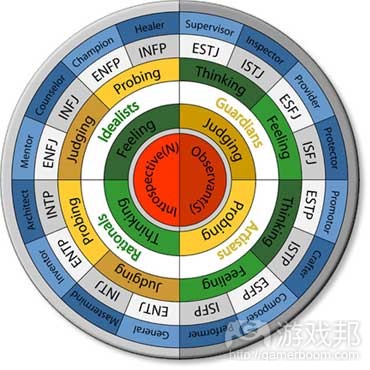阐述4种玩家类型对销售管理者的启示
作者:Mike Smalls
在职场中,大多数员工都可以使用Myers-Briggs(游戏邦注:一种迫选型,自我报告式性格评估测试)或DISC等性格分析工具去决定怎样的角色更能发挥自己的所长。当工作更接近自己的兴趣和性格时,人们才会愿意全身心投入其中,并有效地完成所有任务。举个例子来说,外向的人更适合做销售,而内心的人则更适合扮演分析角色。
有趣的是,在游戏世界中也有许多研究是关于人的性格和兴趣与他们所选择的游戏类型之间的关系。凭直觉来看,我们知道不同性格的人会被不同类型的游戏所吸引。例如,《魔兽世界》的玩家便不会选择《FarmVille》,反之亦然。
90年代中期,作家,教授,同时也是游戏研究员的Richard Bartle面对多用户游戏(MUD)展开了研究,并根据他们的行动或互动,以及是否关心游戏世界或其他玩家而明确了四种玩家类型,即探险者,社交者,杀手和成就者。
让我们详细分析Bartle所明确的这四种玩家类型:
探险者。这类型玩家总是沉浸于与游戏世界的互动,不断探索着游戏的发展与变化。
社交者。他们对玩家间的关系非常感兴趣,将游戏当成了与别人进行互动的工具。
成就者。这类型玩家更重视游戏世界中的种种行动,以获取更高的分数或进入更复杂的游戏关卡为目标。
杀手。他们总是会破坏其他玩家的行动,以干预别人为乐趣。
而这些与工作又有何关系?最近有许多传言,即如果公司能够简化流程与系统便能够提高员工的粘性与执行效率。当管理者像将游戏机制运用到工作中,并希望以此建造一个有效的系统,他们便需要深入了解自己的员工。尽管Bartle的玩家类型并不适用于所有员工,但却呈现出了游戏类型的大体框架,能够帮助管理者更好地激励员工。
例如,大多数玩家属于社交者和探险者,少数玩家则为成就者和杀手。如此看来,销售人员更倾向于成就者和杀手。因为他们喜欢进行友好(或非友好)型竞争。他们较为独立,并会受到奖励的刺激。如果他们的工作变成游戏,我们便会发现其游戏过程与会计人员具有很大的差别。
当我们在设计任何产品或系统时,必须牢记,单一规格或内容并不能吸引所有用户的注意。虽然有效的游戏机制中总是包含了多种不同的元素,但是了解用户才是帮助你走向成功的一大关键因素。
(本文为游戏邦/gamerboom.com编译,拒绝任何不保留版权的转载,如需转载请联系:游戏邦)
What sales managers can learn from the four types of online gamers
By Mike Smalls
In the workplace, most employees have been exposed at one point or another to various personality profile tools like Myers-Briggs or DISC assessments to help determine which roles best suit their strengths. People tend to be more engaged and perform better in jobs that are aligned with their interests and personalities. For example, outgoing people might gravitate towards sales, while introverts might focus on more analytical roles.
Interestingly enough, in the world of games, research has been done to analyze the link between a person’s personality and interests and the types of games to which they tend to be drawn. Intuitively, we understand that different personalities are attracted to different types of games. For example, World of Warcraft players tend not to play Farmville and vice versa.
Back in the mid-90s, Richard Bartle, an author, professor, and game researcher, examined the players of Multi-User Dungeon/Domain (MUD) games and defined four types of gamers. He classified them as explorers, socializers, achievers, and killers, based on whether they acted or interacted, and whether they focused on the world of the game or the other players.
Let’s look at each of Bartle’s gamer types in more detail:
The Explorer. These gamers enjoy interacting with the world of the game, seeking to understand how it works.
The Socializer. Most interested in developing inter-player relationships, socializers use games as a means of interacting with others.
The Achiever. This type values action in the world of the game and seeks to rack up points and advance to higher levels of game play.
The Killer. Killers act on other players, seeking to impose themselves on others.
So what does this have to do with work? There has been a lot of buzz lately about how companies can increase employee engagement and performance when processes and systems are gamified. When thinking about applying game mechanics to work, managers must keep their audience in mind in order to develop an effective system. Bartle’s gamer profiles might not apply to every employee, but can provide a general framework for the types of game mechanics that will best motivate workers.
For example, the vast majority of players tend to be socializers and explorers, while fewer are achievers and killers. Salespeople, however, tend to be more achievement- and killer-oriented than most. They like friendly (and not so friendly) competition. They’re more independent and are motivated by rewards, awards, and trophies. So if their job was turned into a game, it would have to look very different from one designed for an accountant.
When designing any product or system, one size does not fit all — There are obviously a number of factors involved in the effective application of game mechanics, but keeping the audience in mind is one of the most important keys to success.(source:venturebeat)








































 闽公网安备35020302001549号
闽公网安备35020302001549号